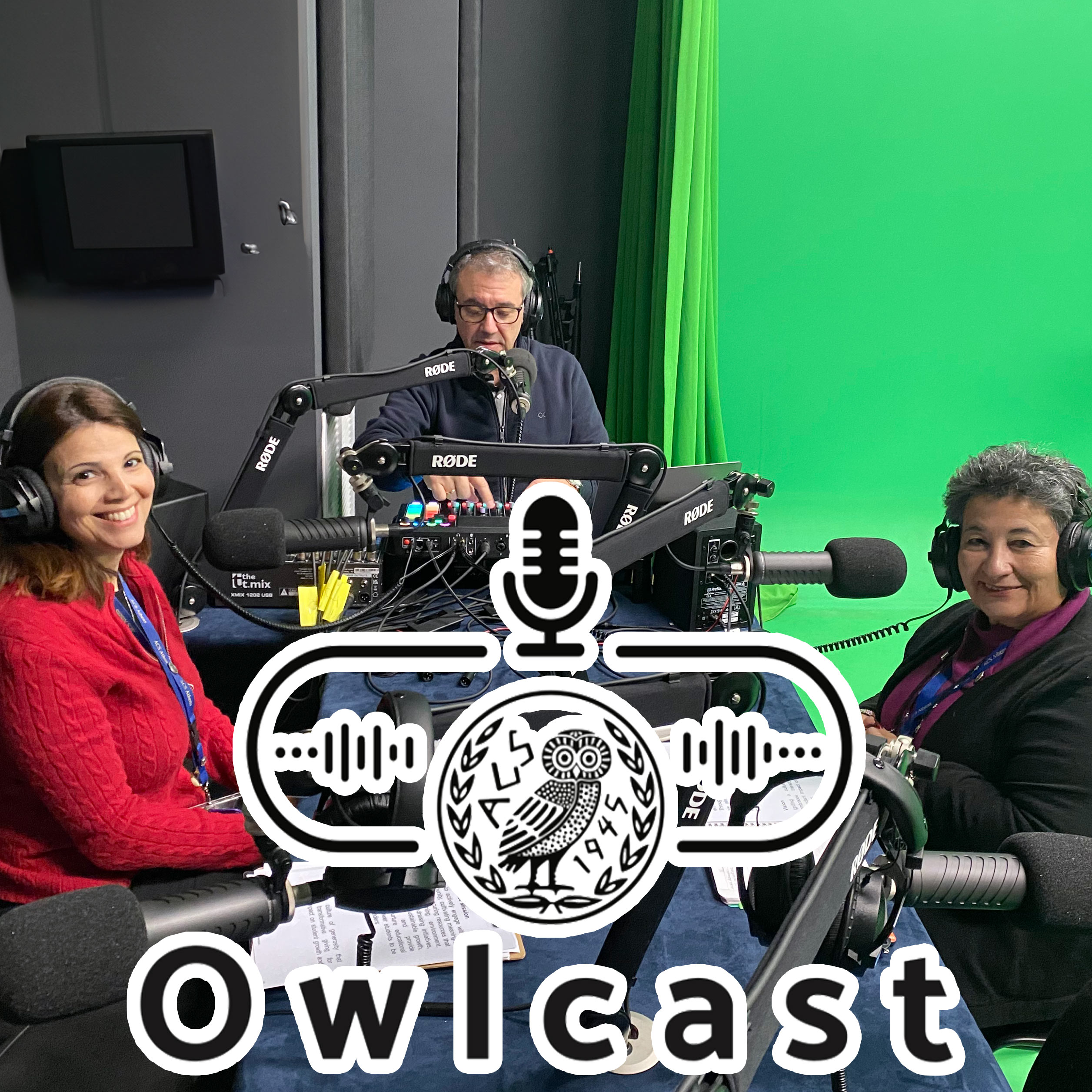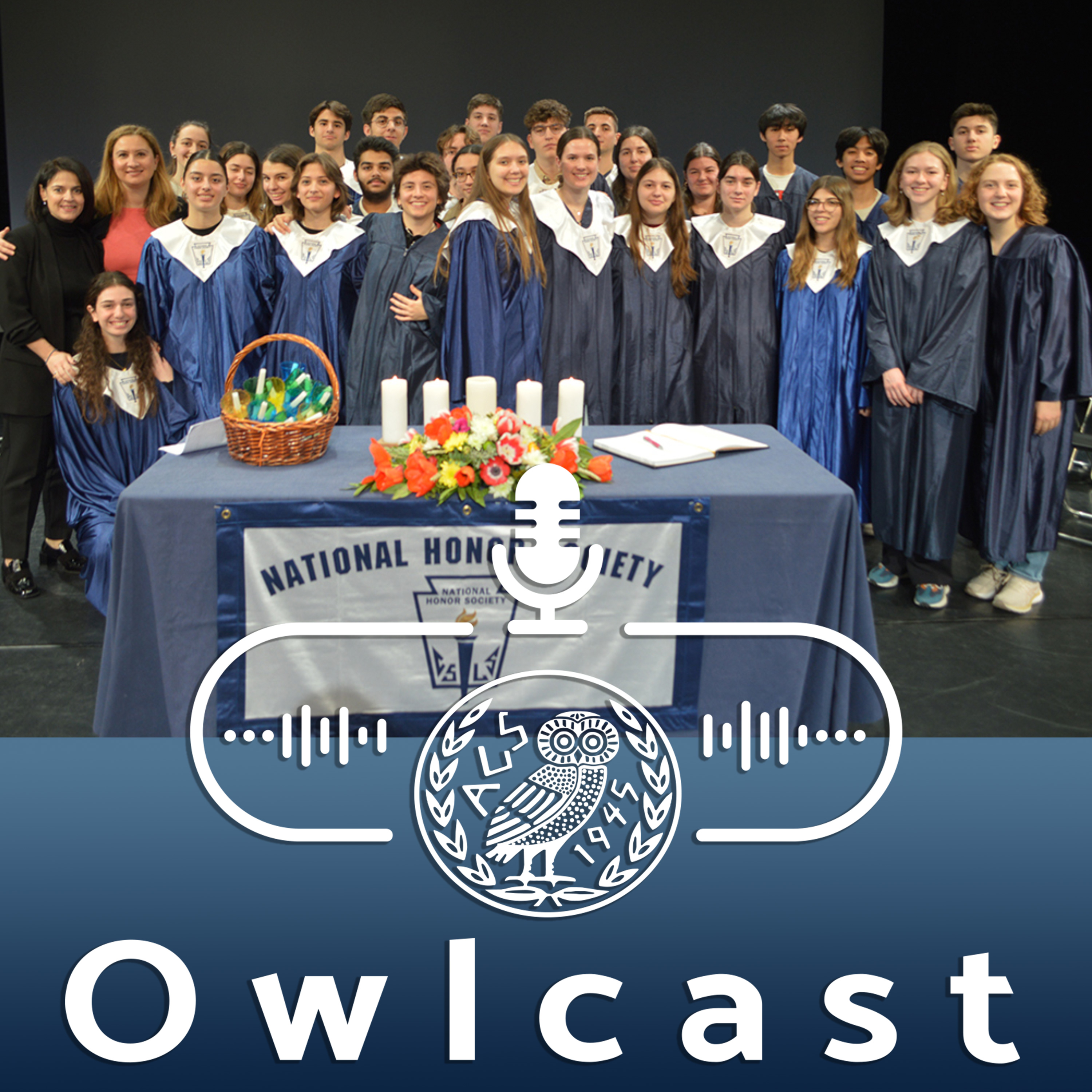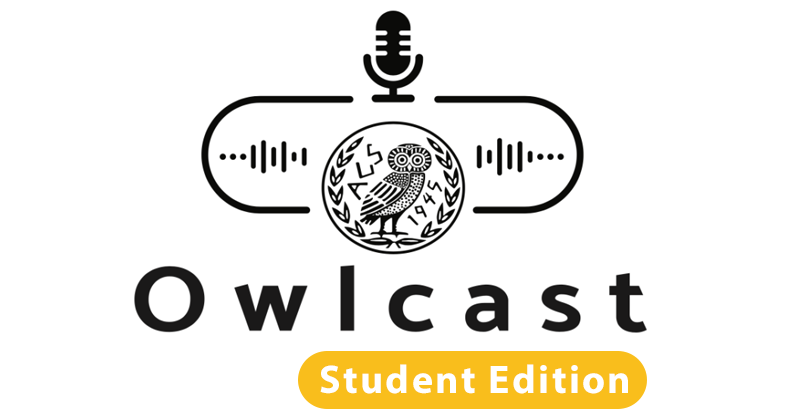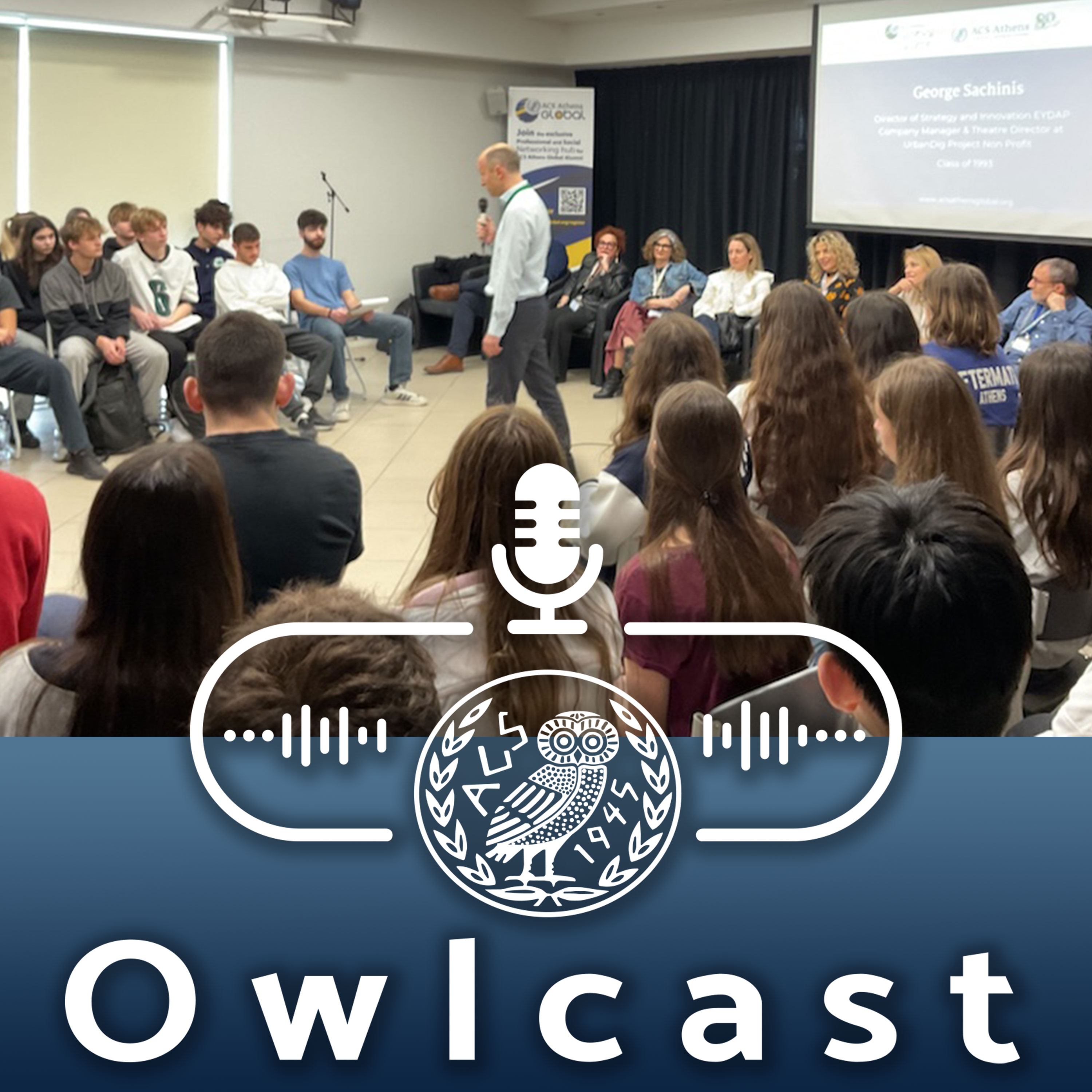Episode Transcript
[00:00:10] Speaker A: This is the owlcast, the official podcast of ACS Athens.
Listen to the exciting story of the american community schools of Athens.
Check out what drives all the members of our international community of learners as we create the education of the future.
Here's John Papadakis.
[00:00:43] Speaker B: Welcome to another episode of the Owlcast. Today, we attempt to probe the dynamic world of institutional development through community involvement and fundraising in international education.
In today's episode, we have invited two remarkable colleagues who have dedicated their careers to education, supporting the operation, character and spirit of the school, and now are spearheading the growth and development efforts of ACS Athens. Joining us are Chris Parakis, a retired educator with decades of experience within the school community as a teacher, special education specialist, and program leader, and Lydias Cabavilla, an alumni and member of the executive team of our ACS Athens Global Alumni organization. Throughout their tenure, both guests have witnessed firsthand the transformative power of institutional development, from its crucial role in enhancing educational resources to its profound impact on student experiences. With their combined expertise, they offer unique perspectives on navigating the challenges and seizing the opportunities inherent in fundraising for educational institutions. From cultivating donor relationships to leveraging alumni networks, our guests exemplify the collaborative spirit and unwavering dedication required to take ACS Athens forward through the amazing accomplishments and successes of our students. As they become the legend bearers of our school, we attempt to inspire our community members and the wider international community to give back to their alma mater so that it can continue offering the best educational opportunities to our families and their children. How we drive engagement and why this is important is as crucial as meeting and surpassing the educational vision of the school. Let's see what they have to say.
[00:02:46] Speaker C: You've been in the school for a few years now. I'm not going to count. I'm not going to say the number, not because we don't want to show how many years you've been here, but the idea that you know the school, it makes a big difference in your new role. So if you can tell us a little bit about your journey with the school from your time as an educator and as a student until now that you are involved in institutional fundraising or development or how do you describe your job right now?
[00:03:18] Speaker D: My job? That's a good question.
It's not a job. I think.
[00:03:25] Speaker C: Is this a project or is it a job, or is it a combination of two?
[00:03:29] Speaker D: It's a combination of two. It's something that we're giving back to the ACS community, to our students.
We are trying to make their learning journey. Give them a boost.
[00:03:42] Speaker C: Okay. Because Ms. Barakis here is very good at condensing things.
[00:03:47] Speaker D: Yes.
[00:03:48] Speaker C: So you are in an elevator, Ms. Barakis, and someone is asking you, what are you doing at ACS right now? What would you tell them?
[00:03:57] Speaker E: I'm retired.
[00:03:59] Speaker C: Yeah, but retired not in spirit.
[00:04:02] Speaker E: Of course not. I think ACS as being my second home since 1981, since, you know, that I've been here having evolved through being an educator, director of programs, coordinator, et cetera, et cetera, I was asked to support the school in the development area and mentor Ms. Lydia because she was a good fit for the job. So me having a little bit more experience in the ways processes and procedures are going through the school, I was asked to support Ms. Lydia's opportunities or whatever she has to do in the future and strategically coming up together with activities, with fundraising that are meaningful and come back to the students.
[00:04:54] Speaker C: So from the time that you've been an educator until now, what do you think from your function as an educator? What do you think, in a sense, benefited your approach to fundraising, to development at this point, you've seen how the school benefits the students. You've seen how they are formed as individuals. How does development fit in this?
[00:05:17] Speaker E: Those of you that know me always know that whatever decision I make is student centered. With education evolving over the years, with new things all the time, schools need to be developed to be state of the art facilities and programs and have top educators like we have in order to allow the students to be empowered to become whatever they want to become in the future.
I'm a person that likes to give money if I have, but not ask for money. So it was a challenge for me, and because I like challenges, I said, well, I'll give it a try and see what happens. It's been very powerful to see that if you share the story, common stories, over the 40 plus years with students you had in the past, they engage in the conversation and want to give back to their school.
Therefore, we're trying to build bridges. We try to build opportunities and connections with everyone that's ACS alum or ACS friend. And this is how we listen to them and try to figure out what is the best way to engage them in becoming partners in whatever we want to do in the development office.
[00:06:37] Speaker C: So, Lydia, you've been working with students, you've been working with alums, you've been working around the school for different capacities, but this is a little bit different. But my question stands. From your time as just an administrator or as a student until now, what do you think empowers you to do what you're doing right now?
[00:06:57] Speaker D: Because it's a journey, and we're always connected. For this year, we're raising funds to upgrade our science labs. So we have the name a seat initiative.
So when we went into the science labs and we're talking with the students, especially the academy students, and we told them, we shared our story, I said I was a student here in the 90s in this particular room, and Ms. Perakis was a teacher here once.
[00:07:27] Speaker C: You did biology, if I'm not mistaken, Ms. Paracis.
[00:07:29] Speaker E: I did earth science and environmental science.
[00:07:32] Speaker C: Okay.
[00:07:33] Speaker D: And because ACS Athens is a nonprofit organization. So we explained what was that to the students? Because a lot didn't know. We need to come up with initiatives to raise money so we can upgrade our facilities. So once they started thinking about it, they got more involved. That shows, I think, how powerful our students are. And by sharing our stories, they followed. They did a movie night and raised money our seniors and bought a seat in the theater. And the money went for the science labs.
[00:08:13] Speaker C: Right.
[00:08:13] Speaker D: So we share our story. We follow up.
[00:08:17] Speaker E: We lead by example, I think. And when others say, there's nothing I can do to raise money, we show them that there is. And that is our pizza initiative every Tuesday. And the money that we raise goes towards the name a seat to support our science lab.
[00:08:34] Speaker C: Can you describe the name a seat initiative? Very briefly?
[00:08:38] Speaker D: So we have our beautiful ACs Athens theater. You buy a seat for life and you name after yourself your favorite teacher. Or you put a phrase you want.
[00:08:50] Speaker C: Or as a team or as a group. Right?
[00:08:52] Speaker D: Yeah. Or as an individual. It's up to you. It can be a class of 2024 or it can be for your favorite teacher.
[00:09:00] Speaker C: It's a legacy thing.
[00:09:01] Speaker D: Exactly.
[00:09:02] Speaker E: And you know what it is, Mr. Papadakis? It's really heartwarming to see that, actually students have come back and wanted to name a seat for one of their teachers that inspired them to be where they are right now. So again, student centered. All the things that we do, they do appreciate it at some point in their life. So it's really important.
[00:09:27] Speaker D: And we're very happy as an office that we have so many student volunteers. It's from lunch, after school, middle school and high school.
[00:09:37] Speaker E: Yes. They see what we do.
We educate them every step on the way. They're part of supporting us in what we do, and we empower them in the long run to become conscience global leaders.
[00:09:55] Speaker D: They develop and mature at the same time.
[00:09:58] Speaker C: Let me ask a question. What is so special that is going to make someone come to tell you, I want to donate? I want to help the school develop even further. Although it's common knowledge, this is a very historic school. It has alarms all over the world. We have retirees that are coming regularly to visit and reminisce and see the school. Why would someone make that move and start supporting actively, not just volunteering?
[00:10:31] Speaker E: If you're referring to giving back to the school, I think looking at the students that have gone and are going in prestigious universities and colleges throughout the world, becoming top scientists with AI, technology and everything else that I'm not aware of and still trying to learn these days, companies and other people would like to be part of this evolution of teaching and learning that happens in the school. I think we are prototype, and many of the things that we have done in the past and are doing in the future are being discussed in other schools throughout the world as good models to follow. So it's empowering, again, not just the students, the teachers, to do their very best to support the students that will be there for the 21st century. Our future, global leadership.
[00:11:36] Speaker A: You are listening to the owlcast, the official podcast of ACS Athens.
[00:11:50] Speaker C: So you've been in this capacity for a little bit over a year from September.
[00:11:55] Speaker D: Exactly.
[00:11:56] Speaker C: So in this amount of time, we had a few events, like the gala, like some reunions that we either hosting or sponsoring or supporting in some way. Could you think of a major challenge that you faced in the development office, either in defining the scope of fundraising or development or approaching people in order to support these initiatives? What has been a major challenge every.
[00:12:28] Speaker D: Day is a challenge for us, I think.
[00:12:30] Speaker C: In what way?
[00:12:31] Speaker D: It also has to do with our characters. We're not people who ask. We're people that we give. So we give first and then we wait to see their responses.
[00:12:43] Speaker C: Okay. This is a personal trait. I'm talking about your function.
[00:12:47] Speaker D: First of all, we look within our community and then through global, our alumni community.
[00:12:53] Speaker C: ACS Athens Global.
[00:12:54] Speaker D: Yes.
[00:12:55] Speaker C: Okay.
[00:12:55] Speaker D: Our alumni community has taught to give back. They come back to the schools. We do back to school tours. They talk with students. They want to become mentors. They want to help them find a job or even an Internship. I mean, just yesterday, student reached out to me that graduated a couple of years ago. He said, I'm looking for an internship. Could you please put me in contact with other alums in that area? I forwarded the cv and he's like, he has a couple of interviews. So we help within our community, our people, so they feel that they want to help others.
[00:13:38] Speaker C: So in a sense, you're trying to capitalize on the added value of being either an alum, right, or a general member of the community. So I guess my question is, do you need to convince someone to say, you know what, I understand you've been supportive. I understand that you came to the school many times, but we want to go to the next step. We want to go to a different level of support.
[00:14:01] Speaker D: Convincing. I don't like the word, because if you need to convince them, it's like asking them to do something they don't.
[00:14:06] Speaker C: Want to do or they don't know that they can do something about it.
[00:14:10] Speaker D: So we're creating awareness. So by creating awareness, they understand and they might feel the need that they want to do this. They want to be a part of this journey. They want to be a part of the science labs. They want to give scholarships for students who are going to be future doctors or scientists. They're going to save the world with a new medicine.
[00:14:34] Speaker E: I think it's making meaningful relationships again and connections. Once they come back, they see the value that they had going through the school. They remember their friends and where they are now, and they say, wow, it still has the same and even better Avra going through the school. And if they're able to help out, they can. Let's not forget where I go back to leading by example. We have the youth to youth program. Not everyone is as privileged to be in an international school, but we're showing that everybody can. If there's people that would like to give back, and with nice scholarships or donations or foundations that can help, we can find the way to make this happen, no matter who it is. And it's a soft spot. You have to hit someone's soft spot. And when you really think about it, our journey in this world is about learning, giving and being appreciated. And I think what Livia and I are doing, we have the excitement about the school. We like to share stories, we like to show people around what we're doing. And I think our personal touch is what is giving us the opportunity to share with the community what we're doing. And those that are able to give back to us, they do well.
[00:16:02] Speaker C: The fact that we are a school means that there is a unique value behind what we offer. And if anything, a parent is going to invest heavily on the children's education. And from our end, we've seen many parents, we've seen friends of the parents and of course, our alums that are coming back and they say, how can we help? How can we support what you're doing? So the major initiatives that we have right now, what are they? And how can someone approach you to say, I want to help you build this, or I want to help you expand this, or make it better for the benefit of the students? Can we say one or two major things that we are trying to build?
[00:16:48] Speaker E: As you know, the school is almost 80 years old. Therefore the infrastructure, if you start from there in 2025, that's right, next year, we're close, we're one step away.
It needs a lot of refurbishing, as they say. And it does look great inside and out, because every year, the school has a strategic way of putting things in a priority and making it look great. Maintain and remodel, remodel, new it equipment, wiring, you name it. Safety is number one. And we have friends of ACS Athens that they might want to donate anything that goes into a school, from computers to laptops to. Actually, an alum came and saw us last week and he would like to donate some laptops and iPads for the youth, even with our youth, to youth program on Saturday. So there's people that would like to give certain things, could be for the science department, could be for the art department, for any department at all. And we say thank you. But our main initiative this year is for the refurbishing and making state of the art science labs, that all our science labs look the best that they can so the future scientists can actually do all their experiments. So every initiative that we do has to do with the science labs this year.
[00:18:19] Speaker C: And just to give an idea so people understand these labs that we're trying to refurbish and make it more modern, they were refurbished about ten years ago. It's not something that can stay for more than a decade without being, I don't want to say obsolete, but there are so many things that you can add to a science lab all the time.
[00:18:39] Speaker D: Not only that, the students change mobiles within a year. Twice, maybe, I don't know. So we want to provide them with the state of the art facilities. Everything from the stool to the desk to the sink. It has to be.
[00:18:55] Speaker E: And every little bit counts. It doesn't have to be, even though a lab could cost from 80,000 onwards, but any kind of donation name a seat starts from 250, and there's different layers that go up to 2500. And you get a plaque to say whatever you want to say, a dedication to your parents, to your colleagues, to your friends, to your teachers to just a nice quote, whatever you want to say, and that's there for life for everyone to see.
I think we all have to be enculturated in giving back to an institution that has given so much to so many students that are now are doing wonderful things around the globe.
[00:19:42] Speaker C: Well, I think that all these initiatives, whether we call it science labs, whether we call it expanding the campus or whatever we want to call them, these are always for the benefit of the students. And it can be understood by whoever is moving through the halls, through the campus. And I think what you do is definitely some kind of guarantee that the school continues to be effective and to offer these high quality services for the good of the community. Lydiasca Bavia, Chris Barakis, the members of the development team, thank you so much for being with us. Unless you have something else to add to this, we're probably going to have another session in the next year, because I really thought that you were here in this position for more than a year, so that tells you something. You've done so much in less than a year that you really make an impact.
[00:20:38] Speaker E: Thank you, Mr. Papadekis. And those of people that are hearing, we are not just locally. We do share stories by going different places. We're going to Miami next week and in April in London. So if anybody out there is listening that would like to hear our story, how they can support us, we'll be more than happy to talk with them. Thank you.
[00:21:02] Speaker D: Thank you.
[00:21:02] Speaker B: Thank you, ladies.
[00:21:05] Speaker A: You are listening to the owlcast, the official podcast of ACS Athens. Make sure you subscribe to the owlcast on Google Podcasts, Spotify and and Apple Podcasts. This has been a production of the ACS Athens Media studio.



